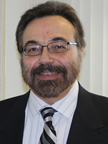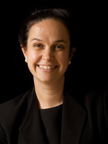|
 |
Wednesday, August 28
09:00 - 10:00
Sparsity and Low Rank for Robust Social Data Analytics and Networking
Georgios B. Giannakis, University of Minnesota
 Download keynote presentation Download keynote presentation
|
|
The information explosion propelled by the advent of personal computers, the Internet, and the global communications has rendered statistical learning from `Big Data' increasingly important. Along with data adhering to postulated models, present in large volumes of data are also those that do not - what are referred to as outliers or anomalies. In this talk, I will start with an approach to outlier-resilient principal component analysis, which establishes a neat link between the seemingly unrelated notions of sparsity and robustness to outliers, even when the signals involved are not sparse. I will argue that controlling sparsity of model residuals leads to statistical learning algorithms that are computationally affordable and universally robust. The impact of these ideas will be demonstrated in applications as diverse as identification of aberrant responses in personality assessment surveys, and unveiling communities in social networks, as well as intruders from video surveillance data. In the second part of the talk, I will switch focus towards the important task of unveiling and mapping-out network anomalies given link-level traffic measurements. Leveraging the low intrinsic-dimensionality of end-to-end network flows and the sparse nature of anomalies, I will show how to construct an estimated map of anomalies in real time to aid in monitoring the network health state. If time allows, I will finally highlight additional application domains that include predicting network-wide path latencies, and load curve cleansing and imputation -- a critical task in green grid analytics and energy management with renewables.
|
| |
Biography
G. B. Giannakis (IEEE Fellow'97) received his Diploma in Electrical Engr. from the Ntl. Tech. Univ. of Athens, Greece, 1981. From 1982 to 1986 he was with the Univ. of Southern California (USC), where he received his MSc. in Electrical Engineering, 1983, MSc. in Mathematics, 1986, and Ph.D. in Electrical Engr., 1986. Since 1999 he has been a professor with the Univ. of Minnesota, where he now holds an ADC Chair in Wireless Telecommunications in the ECE Department, and serves as director of the Digital Technology Center. His general interests span the areas of communications, networking and statistical signal processing - subjects on which he has published more than 340 journal papers, 560 conference papers, 20 book chapters, two edited books and two research monographs (h-index 99). Current research focuses on compressive sensing, cognitive radios, cross-layer designs, wireless sensors, social and power grid networks. He is the (co-)inventor of 21 patents issued, and the (co-) recipient of 8 best paper awards from the IEEE Signal Processing (SP) and Communications Societies, including the G. Marconi Prize Paper Award in Wireless Communications. He also received Technical Achievement Awards from the SP Society (2000), from EURASIP (2005), a Young Faculty Teaching Award, and the G. W. Taylor Award for Distinguished Research from the University of Minnesota. He is a Fellow of EURASIP, and has served the IEEE in a number of posts,
including that of a Distinguished Lecturer for the IEEE-SP Society.
|
 |
Friday, August 30
13:40 - 14:40
On the interaction between network coding and the physical layer
Muriel Médard, Massachusets Institute of Technology
 Download keynote presentation Download keynote presentation
|
| |
While the flexibility of network coding allows us to consider its introduction in many different ways, a consensus regarding the most beneficial placement in the network, both in terms of layers and physical location in the network, has not yet emerged. In particular, the question of whether joint physical layer and network coding are beneficial remains. In this talk, we present some recent information-theoretic results and two practical applications illustrating this question. We begin by considering, from an information theoretic point of view, whether network coding at the physical layer and the network layer benefit from being integrated or not. We argue that such integration does not show benefits at low SNR regimes and marginal benefits at high SNR regimes. We then consider two examples of network coding implementation, one above the MAC in a WiMax base station, the other in a chip that also performs physical-layer coding. In these cases, we show that having both physical-layer and network coding provides benefits, even if the two codes are implemented and managed separately.
|
| |
Biography
Muriel Medard is a Professor in EECS at MIT. She was previously an Assistant Professor at UIUC and a Staff Member at MIT Lincoln Laboratory. She received B.S. degrees in EECS, in Mathematics and in Humanities, and her M.S. and Sc. D. degrees in EE , all from MIT. She was awarded the IEEE Leon K. Kirchmayer Prize Paper Award (2002), the IEEE Communication Society and Information Theory Society Joint Paper Award (2009), and the William R. Bennett Prize in the Field of Communications Networking (2009). She received the 2004 MIT Harold E. Edgerton Faculty Achievement Award. She was named a Gilbreth Lecturer by the National Academy of Engineering in 2007. She is a Fellow of IEEE, and served as President of the IEEE Information Theory Society. Her research interests are in the areas of network coding, wireless networks and reliable communications, particularly for optical and wireless networks.
|
 |
Thursday, August 29
09:00 - 10:00
How Much Energy Needs a Bit?
Josef A. Nossek, Munich University of Technology
 Download keynote presentation Download keynote presentation
|
| |
|
| |
Bigraphy
Josef A. Nossek earned the Dipl.-Ing. degree and the Dr. techn. degree, both in electrical engineering, from University of Technology in Vienna, Austria in 1974 and 1980, respectively. He joined SIEMENS AG, Munich, Germany, in 1974˜, where he was engaged in the design of both passive and active lters for communication systems. In 1978, he became Supervisor, and in 1980, Head of a group of labs engaged in designing monolithic filters (analog and digital). Since 1982, he has been the Head of a group of labs designing digital radio systems within the Transmission Systems Department of SIEMENS AG. In 1984, he was a Visiting Professor at the University of Capetown. From 1987 till 1989, Josef A. Nossek was Head of the Radio Systems Design Department, where he was instrumental in introducing high speed VLSI signal processing into digital microwave radio. Since April 1989, he has been a Professor of Circuit Theory and Design at the Technische Universitaet Muenchen (TUM), where he teaches undergraduate and graduate courses in the field of circuit and system theory, and he leads research on signal processing algorithms in communications, especially multiantenna communication systems. Josef A. Nossek was President Elect, President and Past President of the †IEEE Circuits and Systems Society in the years 2001, 2002, and 2003, respectively. He was vicepresident of VDE (Verband der Elektrotechnik, Elektronik und Informationstechnik e.V.) 2005, and 2006, and was President of VDE in 2007, and 2008˜. His awards include the ITG Best Paper Award 1988˜˜, the Mannesmann Mobilfunk (now Vodafone) Innovationsaward 1998, the Award for Excellence in Teaching from the Bavarian Ministry for Science, Research and Art in1988˜. From the IEEE Circuits and Systems Society he received the Golden Jubilee Medal for "Outstanding Contributions to the Society" in 1999, and the Education Award in 2008˜. Josef A. Nossek was awarded the "Bundesverdienstkreuz am Bande", in 2008. In 2009, he became elected member of acatech, the German National Academy of Engineering. In 2012 he received the Guillemin-Cauer Best Paper Award for the publication "Towards a Circuit Theory of Communication".
|
 |
Friday, August 30
09:00 - 10:00
Games, Privacy and Distributed Inference for the Smart Grid
Vincent Poor, Princeton University
 Download keynote presentation Download keynote presentation
|
| |
Smart grid involves the imposition of an advanced cyber layer atop the physical layer of the electricity grid in order to improve the efficiency and lower the cost of power use and distribution, and to allow for the effective integration of variable energy sources and storage modes into the grid. This cyber-physical setting motivates the application of many techniques from the study of wireless networks to problems arising in the electricity grid, and considerable research effort has been devoted to such application in recent years. This talk will describe recent work on three aspects of this problem: applications of game theory to the modeling of the interactions of nodes on the grid; characterization of the fundamental tradeoff between privacy and utility of information sources arising in the grid; and distributed inferential algorithms that are suitable for the topological constraints imposed by the structure of the grid.
|
| |
Bigraphy
H. Vincent Poor is the Michael Henry Strater University Professor at Princeton University, where he is also the Dean of Engineering and Applied Science. His research interests are primarily in the areas of stochastic analysis, statistical signal processing, and information theory, and their applications in wireless networks and related fields. Among his recent publications is the book Principles of Cognitive Radio (Cambridge, 2013). Dr. Poor is an IEEE Fellow, and a member of the US National Academy of Engineering, the US National Academy of Sciences and the Royal Academy of Engineering of the UK. He received the Marconi and Armstrong Awards of the IEEE Communications Society in 2007 and 2009, respectively. Recent recognition of his work includes the 2010 IET Ambrose Fleming Medal, the 2011 IEEE Eric E. Sumner Award, and honorary doctorates from Aalborg University, the Hong Kong University of Science and Technology and the University of Edinburgh.
|
 |
Wednesday, August 28
13:40 - 14:40
Networking Machines for Energy Management
Anna Scaglione, University of California at Davis
 Download keynote presentation Download keynote presentation
|
| |
Communications for industrial automation had little luster in the past, occupying a minor role in the progress of wireless standards. This state of things lasted until recently, when the area of Machine to Machine communications gained great interest from researchers and spurred several standardization efforts. In this talk we will discuss one of the premier and most challenging applications of communications among machines, which is energy management and reliable electrical power delivery. We will define applications for sensing, controlling and scheduling electrical machines consumption. These applications will shed light on what are the truly important features and challenges that these networks have to face and what physical, access and network layer problems arise. We will discuss recent advances on decentralized synchronization and coordination of wireless networks that can address some of these design challenges.
|
| |
Biography
Prof. Anna Scaglione (M.Sc.'95, Ph.D. '99) is currently Professor in Electrical and Computer Engineering at University of California at Davis. She joined UC Davis in 2008, after leaving Cornell University, Ithaca, NY, where she started as Assistant Professor in 2001 and became Associate Professor in 2006; prior to joining Cornell she was Assistant Professor in the year 2000-2001, at the University of New Mexico.
She is a Fellow of the IEEE since 2011 and was honored by both the Signal Processing and the Communication Societies. She is the Editor in Chief of the IEEE Signal Processing Letters, and served as Associate Editor for the IEEE Transactions on Wireless Communications from 2002 to 2005, and from 2008 to 2011 in the Editorial Board of the IEEE Transactions on Signal Processing from 2008, where she was Area Editor in 2010-11. She has been general chair of the workshop SPAWC 2005 in the Signal Processing for Communication Committee from 2004 to 2009 and is in the steering committee for the conference Smartgridcomm since 2010 and is currently in the Board of Governors of the SIgnal Processing Society. Dr. Scaglione is the first author of the paper that received the 2000 IEEE Signal Processing Transactions Best Paper Award; she has also received the NSF Career Award in 2002 and she is co-recipient of the Ellersick Best Paper Award (MILCOM 2005) and of the 2013 IEEE Donald G. Fink Prize Paper Award. Her expertise is in the broad area of signal processing for communication systems and networks. Her current research focuses on studying and enabling decentralized signal processing in networks of sensors. She also focuses on sensor systems and networking models for the demand side management and reliable energy delivery. |
| |
|
| |
|
| |
|
| |
|
| |
|